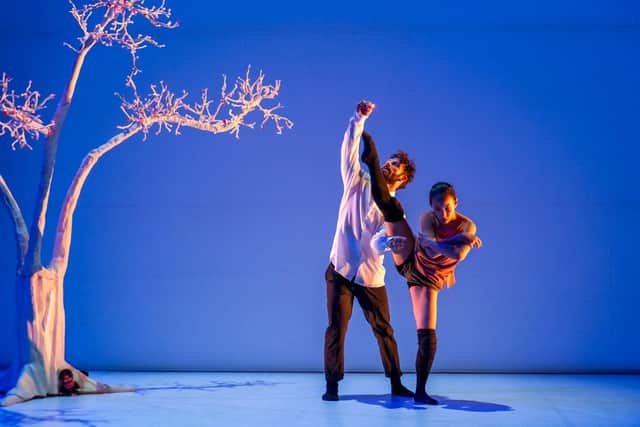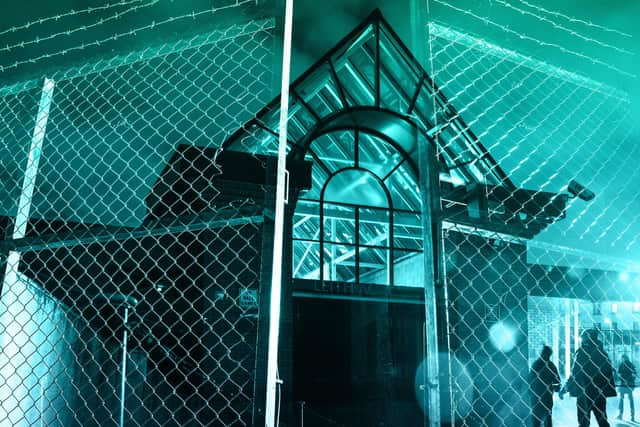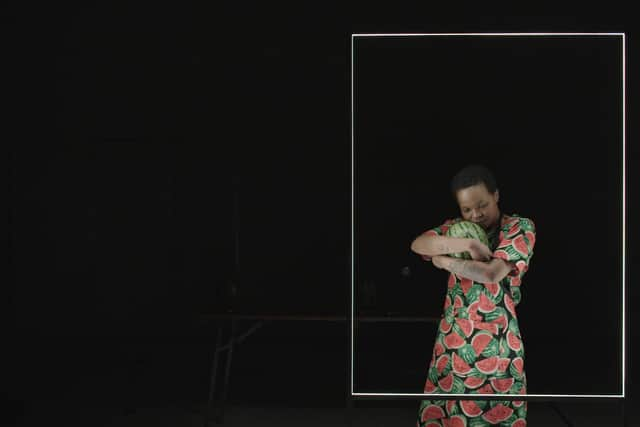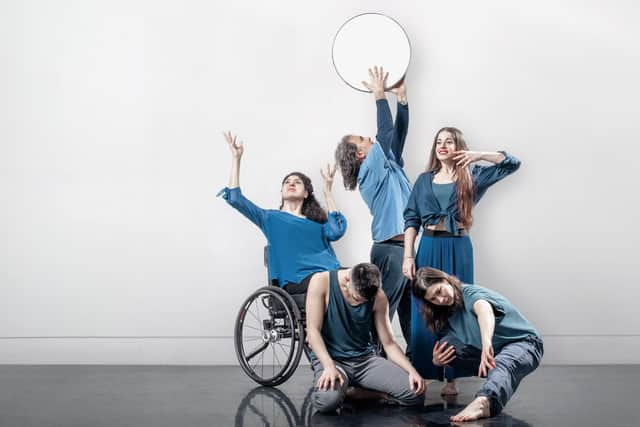‘There are no others, only humans’ – shows by and about refugees across Edinburgh’s festivals
It could be said that the Edinburgh festivals began with a refugee. The co-founder and first director of the Edinburgh International Festival, Rudolf Bing, was Jewish and fled Nazi Germany in the 1930s. Like many of the creative people leaving occupied Europe, he brought fresh cultural energy to the UK, and later to the USA.
As the EIF celebrates its 75th anniversary, the festival has programmed a selection of work at the Festival Theatre Studio in collaboration with the Scottish Refugee Council. The Refuge season shifts the focus away from familiar refugee stories of struggle and trauma, giving a platform to a range of voices and companies presenting some of the most innovative work at this year’s festival.
Emma Hay, programme manager at EIF and curator of Refuge, says she went looking for artists for whom refugee and migrant issues are central to their practice. Most are based in the UK, but many were born elsewhere – Palestine, Jamaica, Zimbabwe, Iran, to name a few locations – and their work in music, dance, theatre and visual art often crosses genre boundaries.
Zimbabwe-born mandla rae explores their own battle for their identity having moved to the UK in performance piece as british as a watermelon; Farah Saleh and Oguz Kaplangi combine dance, music and theatre in A Wee Journey; artist Leena Nammari creates a floating image of a house in Palestine on the frontage of the Festival Theatre Studio, and Detention Dialogues, produced by ice&fire Actors for Human Rights, presents verbatim accounts of experiences in immigration removal facilities in the UK read by actors.
Dance partnership Wang Ramirez stages We Are Monchichi, for ages seven-plus, a non-verbal exploration of what happens when different cultures come together. Emma Hay says: “There are parts of the programme that deal with the darker aspects, but there are also messages of hope and positivity. Refuge hopefully shows how you create and share spaces, welcoming people in, bringing in other cultures to create something bigger than ourselves. I hope this embodies the spirit of our origins.”
There can even be humour in being a refugee, or at least so claims Emo Majok, the exuberant Sudanese-Australian stand-up comic making his Fringe debut this year with African Aussie. He was born in an East African refugee camp after his parents fled South Sudan, and spent the first eight years of his life in camps before a charity helped the family settle in Perth, Australia.
Always the family clown, he finds humour in his memories, living with his family in “a mud hut the size of a bathroom – it was cosy!”, and the shock of arriving in Australia and moving into a house filled with modern appliances they didn’t know how to use.


He says: “I was born stateless, I had no country to call home. At times, people get teary when I tell them about my upbringing. There are no violins for any of this – it was just the norm. I was born into it – I thought maybe everyone was living like this.”
After a friend persuaded him to try his hand at an open-mic night, he went on, a couple of years later, to win the Western Australia state final of Raw Comedy, and to perform for over 3000 people in the 2018 Melbourne International Comedy Festival. His refugee story is just one part of his material along with family, work, relationships and becoming a regular Aussie.
“My life has always been an open book – I’ve never shied away from telling about the struggles I’ve come through. But I don’t have ‘struggle’ written on my head, and there’s no chip on my shoulder. As far as I was concerned, my life was normal. You can’t miss what you didn’t have. I’m not limited because of my past – my past drives me to want more.”
The theme of adjusting to life between cultures is present in a range of Fringe shows this year, from Tickbox by Scottish-Pakistani actor Lubna Kerr (known to many as Mina in Still Game) at Summerhall, and Made in India/Britain by Rinkoo Barpaga at Pleasance (who is deaf, and performs in BSL with an actor voiceover). British performance artist Sonia Hughes stages I Am From Reykjavík, described as “part protest, part sculpture, part ceremony”, exploring what it means to be a citizen of the world by setting up her temporary dwelling in different parts of Edinburgh.


Silkworm, by Glasgow-based Romanian playwright Vlad Butucea, explores the story of two Nigerian women seeking asylum in Scotland on grounds of their sexual orientation (homosexuality is still illegal in Nigeria, punishable by up to 14 years in prison). One of the winners of this year’s Assembly Art Award, the play is produced by Pearlfisher, a new writing company run by Caitlin Skinner, Mike Griffiths and Philip Howard. From a tower block in Glasgow, Omolade and Abidemi argue their case with the Home Office while trying to keep their relationship together.
Director Mojisola Elufowoju, who worked as a human rights lawyer in Nigeria for ten years before becoming a theatre director, says the play opens up aspects of the asylum process many people won’t be aware of. “It’s different from many of the stories of asylum seekers that we tend to hear. They have to prove they are in a relationship with someone of the opposite sex. How do you do that? How do I prove that I am a heterosexual? The Home Office has a fixed idea of what somebody who’s gay looks like, and every case starts with the assumption that you are not a genuine asylum seeker.”
While it’s a tough journey, she says Butucea’s play is full of poetry and humanity. “I love the way he explores the human experience of these two women. It’s also very funny. Underneath all the trauma and negative impacts of the asylum process, you see these women with really beautiful spirits navigating their way through it and finding hope.”
Sami Ibrahim’s A Sudden Violent Burst of Rain, part of the showcase in the Paines Plough Roundabout, takes a very different approach to exploring bureaucratic immigration processes. Described as “a poetic fable about the immigration system”, it uses magic realism to delve into harsh realities.


Ibrahim says: “It started with thinking a lot about citizenship. It’s something you don’t have to think about if you have it, but if you don’t, it becomes very complicated. If you’re not a citizen, what does that mean, and what does it mean to make a nation your home?”
Elif is a woman who shears sheep and makes clouds, queueing at the end of each day at the city gates hoping for sanctuary. “There’s a poetic fairytale world and a realistic world, and the play is jumping between the different worlds to tell the story. It becomes a play about storytelling, how you explain things to children, how stories are passed on.”
Reading first-hand accounts by people applying for British citizenship left him amazed at the amount of time, money and bureaucracy that are required – not to mention the profit the government appears to make from the system – but he says the play is not there primarily to impart information. “My way into the story was less about the injustice of the system that we have, although that is a motive, but to explore the complicated feelings that come from it and tell a more personal story.”
A different approach again is employed by Edinburgh-based Grid Iron, in Muster Station: Leith, for EIF, which aims to give us – the audience – a sense of what it feels like to be refugees. The company, which specialises in site-specific theatre, has turned Leith Academy into a muster station for Scots fleeing the country in the final stages of a climate emergency.
Director Ben Harrison said it was important to bring in writers to work alongside him with knowledge of the refugee experience: playwright Nicola McCartney and poet and playwright Tawona Sitholé, both of whom have worked with asylum seekers, and Uma Nada-Rajah, whose play Toy Plastic Chicken explores racism at airport security.
On arrival, audience members are subjected to rudimentary processing and allocated to colour-coded groups. Rumours are rife about which group is best to be in, and who matches the criteria for entry to the Scandinavian city everyone wants to escape to. How much, the play asks, do we retain our humanity in these circumstances?


Harrison says: “People from different cultures and walks of life are lumped together in the same boat, class divisions and the like are manifested. Several characters in the play recently arrived in the UK themselves from other countries, and in this scenario, they are the experts. There are also people who are Edinburgh born and bred who never thought anything like this would happen to them.”
Fundamental to the play for him is a quote from Tamil philosopher Sri Ramana Maharshi. “He was asked about how we treat others and his answer was that there are no others – we’re all human. We’re told there are others by the government, but we all need the same things: love, shelter, clothing, food. That runs underneath the whole political, social and cultural subtext of the show.”
Muster Station: Leith is at Leith Academy, 18-25 Aug; Silkworm is at Assembly Roxy, 6.50pm, until 29 Aug; A Sudden Violent Burst of Rain is at the Roundabout @ Summerhall until 27 Aug (times vary); Emo Majok: African Aussie, is at Underbelly Bristo Square, 8.30pm, until 29 Aug. For more information on the EIF Refuge programme, see www.eif.co.uk/profile/refuge